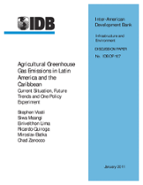Agricultural Greenhouse Gas Emissions in Latin America and the Caribbean: Current Situation, Future Trends and One Policy Experiment
Date
Jan 2011
This study employs the IFPRI IMPACT model to examine the effects of a hypothetical ban on the clearing of native vegetation for agriculture in tropical areas within LAC on GHG emissions, food production, food prices, and child malnutrition at several spatial scales. Results suggest that a complete ban on land clearing for agriculture would significantly reduce GHG emissions associated with the clearing of forests and other forms of natural vegetation vis-à-vis what would have occurred in the absence of the ban. The ban would also reduce agricultural production within tropical areas in LAC, however, the economic losses are not distributed uniformly across the three sub-regions within tropical LAC- the northern South American rim around the Amazon suffers approximately 45% of all losses in gross value of agricultural output attributable to the ban. The report also finds that at global level, the overall effects on commodity prices of the simulated ban on area expansion on LAC are not large and (hence) the effects on childhood malnutrition are small.



